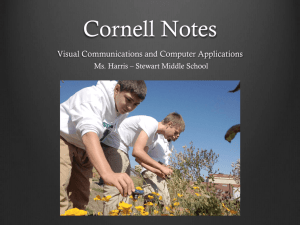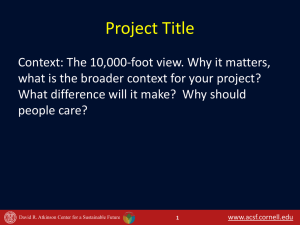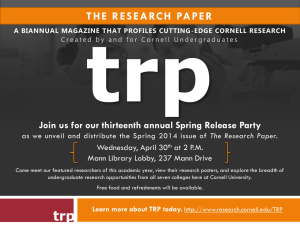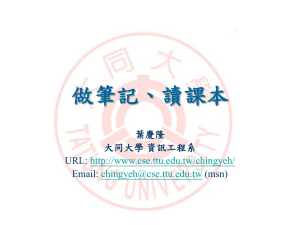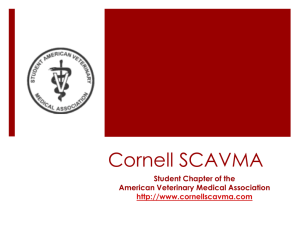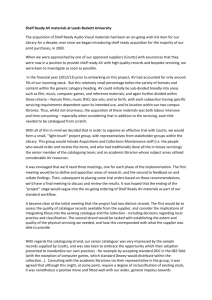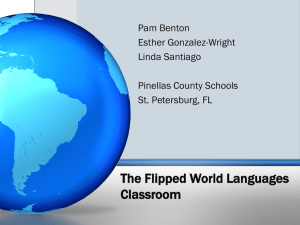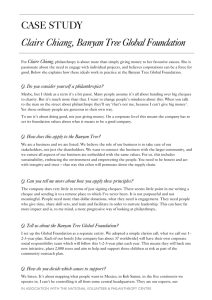ITskillsCORNELL
advertisement
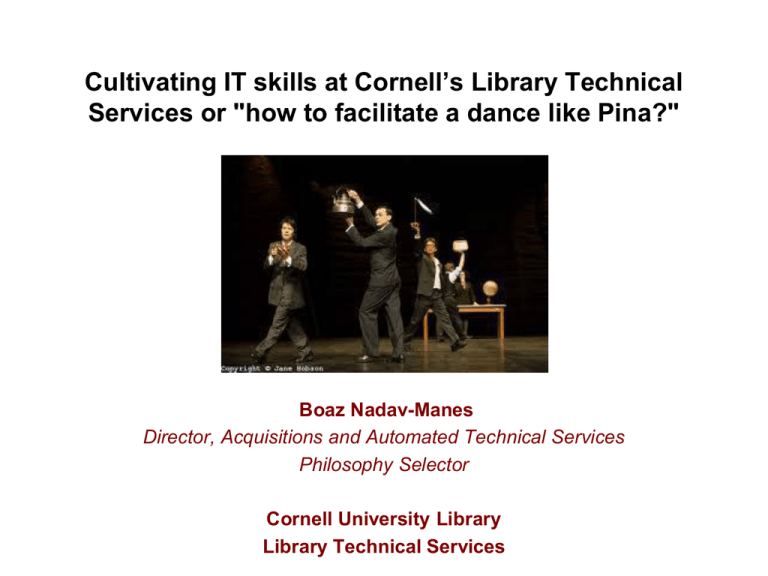
Cultivating IT skills at Cornell’s Library Technical Services or "how to facilitate a dance like Pina?" Boaz Nadav-Manes Director, Acquisitions and Automated Technical Services Philosophy Selector Cornell University Library Library Technical Services Setting the stage: Cornell Technical Services and IT • • • • "Technical Services" vs. "Automated Technical Services". History of innovative co-development. Reporting lines (not much "red tape"). Staff reductions through attrition, early retirements and some layoffs. • Transition to electronic. Guiding steps • Not everything in TS can be automated. • TS Staff are enthusiastic about automatic tools if they are the ones to contribute in developing them and they are the ones to operate them. • Institutional history and “traditional” experience count! As you move forward emphasize more your core values of service and train (not necessarily hire) for higher level positions. • You don’t need to be a code expert as long as you know how to logically describe and write a scope for the solution. • Scalability and Flexibility are keys for good solutions. • Work collaboratively – invite others to contribute and to lead projects. • Most of the automatic solutions are not "ground breaking" from the start - they relieve some marginal FTE counts that add up later on. • The most efficient way is not always the best way (resources, time, and politics are very important!) Repetitions • Understand culture and context. • Risk taking (and assessment to follow). • Investigate local workarounds - "what else can be done with this feature?". • The most qualified person is not always the best person to lead innovation ("project manager", "project champion", "IT lead", "TS lead"). • Cross-train staff and create occasions and time to share ideas. • Normalize expectations again and again. • Talk with vendors and colleagues. Enthusiastically build on grassroots efforts! Practice together General Training for all staff on how to use and design MS-Access reports to streamline TS processes: • • • • Automatic claims (is there a note in PO?) Open purchase orders How much you spent with whom? Who has done what and when? Have a user’s group - teach each other. Coutts deposits records weekly in FTP site (sends notification to ltsbulkl) FLOW with CHARTS: : WCL: “Click here to request Cornell University Library to purchase for you“ Patron Driven Book Flowchart (12/4/10 draft) TS batch loads: dedups + adds local 899: couttspdbappr and other fields (008 field positions 20-21, 506,906) and WCL URL’S in 856 Webauth validates net id YE S TS receives, rush processnotifies access services Coutts: invoices CLO in the end of the month TS pays and changes local 899:couttspdbclo WEB-BASED: Hello [patron] + shows summary of request + “Click confirm to request Cornell University Library to purchase the item below” Coutts inventory query Coutts locates and ships to library YES (=<96) Coutts PO’S automatically created (using embedded id number) with req info (future loc’s are added) OPAC: “ON ORDER” TS: in 24 hours chron job emails patron confirming order. N O NO (> 96) Amazon PO’S created with req info (future loc’s are added) OPAC: “ON ORDER” TS removes 899: couttspdbappr and other fields (008 field positions 2021, 506,906) and WCL URL’S in 856 PD E-batch loads dedups against 035 in PDB and generates a list to be deleted WEB-BASED: “sorry your net id is not valid – return to browse?” WEB-BASED: “We are ordering [title] for you now” Ordering: rush orders the title using the dummy po TS: chron job emails patron confirming order. TS receives, rush process -notifies access services Choose accessories For big projects - adopt Project Management tools (like JIRA) Πάντα ῥεῖ Get into (some) Project Management methodology (SCRUM AGILE) and technical terminology (APIs) Create ecosystems Work on tools that have value beyond TS: POOF! – Pre-Ordering Online Form http://poof.library.cornell.edu/content/about An online tool that automates the largely manual steps required to review and place an order for an item in all formats. 4536 orders as of yesterday - around 40% of our non WCS orders. • The system is built with Drupal, uses queries that acquire bibliographic metadata from WorldCat and present it in a user friendly fashion. • Subject specialists in both Columbia and Cornell can review the bibliographical information and discover if an item is already held by the other 2CUL partner. • The specialist is also able to order, reject, or defer an item for additional review. • A preset matrix determines where the purchase will be made from (based on variables within the metadata associated with the material to be purchased.) • Various scripts enact the decisions in the appropriate system that will create the acquisitions record and purchase order. • The tool provides avenues for subject specialists to interact across institutions with each other (and with contributing vendors) regarding the value of the items reviewed, ranking them in terms of their usefulness, and adding comments. • Maximize simple building blocks (metadata) 1. SSH-Secure Shell using Pre-written Scripts: Commands perform tasks quickly, but offer limited flexibility for record quality and script customization. 2. LS-Tools Web Interface Greater flexibility for accommodating new vendor plans and modifications of records. 3. Combinations of above, adding Perl scripts, OCLC Batch-searching, Z39.50 protocol; and/or MARC-Edit Tool More complex operation, but results in better quality of loaded records. Friendly Interfaces allow non-experts to participate: Locally designed “LS-Tools” Web Interface Consists of 3 main steps: 1. General Import of record files to LS-Tools 2. Modification of files to suit our needs (adding appropriate 948 fields, deleting unneeded fields, etc.) 3. Bulk Import of newly modified records, to be loaded into Voyager in SSH. • Benefits over basic SSH commands: not programmer dependent for new vendor’s files; greater control with a “do-it-yourself” approach. Use pre-existing tools: Opens MARC files into temporary “MRK” files that can be edited (then compiled back into MARC) Using MarcEdit for a more ‘surgical’ approach http://people.oregonstate.edu/~reeset/marcedit/html/about.html Mix and match tools and approaches: Using ISBN Extract with Batch Searching in OCLC After retrieving a MARC file from vednor’s FTP, ISBN-Extract command creates a “.txt” file of ISBNs in a list, and sends it to a designated folder ISBN File is batch-loaded into OCLC to be searched & exported to Local files. Cultivate outside the box thinking: Using PERL Scripts when MARC files are unavailable Script is designed to navigate to Website, enter password, and extract lists of LCCNs from a set of framed pages. Extracting LCCN lists as “.txt” for all un-received LC Jakarta shipments… SHARE (FOLDERS) LCCN Text files are sent directly to relevant vendor folder, pre sorted by country (IO, MY, PH, BR, TH). Allow experts to review exceptions in rotation. Communal deposit of itterative procedures. Publicly Acknowledge Success Market the New Skills Gained to Other Library Groups smile Contact information: btn3@cornell.edu
